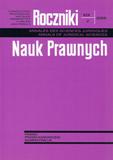Sakramenty wtajemniczenia chrześcijańskiego w normach trzynastowiecznych polskich synodów legackich
The Sacraments of Christian Initiation in the Norms of Polish 13th Century Legate Synods
Author(s): Justyna NapruszewskaSubject(s): Law, Constitution, Jurisprudence
Published by: Towarzystwo Naukowe KUL & Katolicki Uniwersytet Lubelski Jana Pawła II
Keywords: Confirmation; Baptism; Eucharist; papal legate; sacraments of Christian initiation; synodical statutes; legate synod; bierzmowanie; chrzest; Eucharystia; legat papieski; sakramenty wtajemniczenia chrześcijańskiego; statuty synodalne; synod legacki
Summary/Abstract: Synodical statutes issued by papal legates, who were deployed in the Polish ecclesiastical province of the 13th century, are a source of norms related to the sacraments of Christian initiation: Baptism, Confirmation and the Eucharist. These three vital sacraments rank highly in legate legislation. The 13th century was a time of the seven-sacrament theology, which was reflected in the general councils of that era. After publication, these norms were transferred by papal legates to different Christian countries of Europe. The present article describes the statues of four papal legates of the 13th century. The first of them is Jacques Pantaleon, the archdeacon of Liege, who conducted a synod in Breslau in 1248. The second is Cardinal Guido, who used the title of St. Lorenzo in Lucina. He also headed a synod in Breslau in 1267. The next two legates did not conduct their synods in Poland, but their jurisdiction extended also over Poland, apart from other territories. These were: Filippo, the bishop of Fermo, who convened a synod in Buda in 1279, and Giovanni Boccamazza, the cardinal-bishop of Frascati, whose synod took place in 1287 in Wurzburg. A large amount of synodical norms were devoted to the Eucharist. Legates issued norms dealing with the ways to store the Blessed Sacrament, the cult and lithurgical observances, including very detailed norms of decent participation in the Holy Mass. The statues treating of the Sacrament of Baptism tell us about the ordinary and extraordinary forms of the Sacrament, its effects, Eucharist ministers, and they determine the number and rights of godparents. The legate law on the Confirmation focuses on the way to prepare oneself to receive the Sacrament and emphasises the spiritual goods which the candidate will receive from the Holy Spirit. It also regulates the duties of a bishop, who administers the Confirmation, and his obligations related to teaching priests and congregation about the Sacrament as well as the divine graces to be obtained by way of the Confirmation. Summing up, it may be concluded that the work of papal legates in the 13th century Poland was to transfer and include the norms of universal law in particular laws of Poland of the time.
Journal: Roczniki Nauk Prawnych
- Issue Year: 19/2009
- Issue No: 2
- Page Range: 195-219
- Page Count: 25
- Language: Polish

